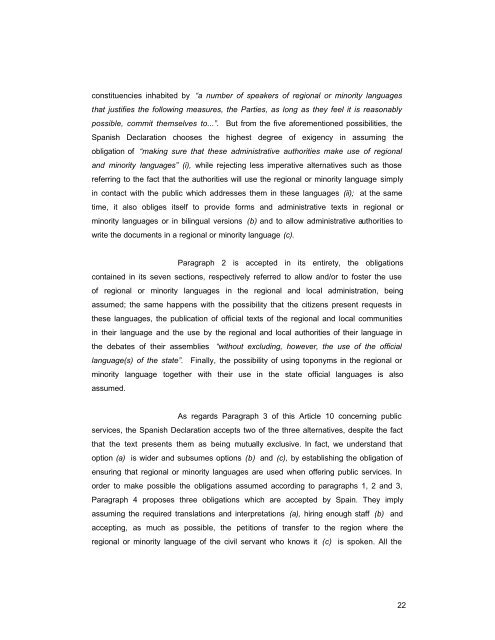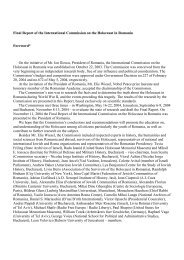get PDF document - MIRIS
get PDF document - MIRIS
get PDF document - MIRIS
You also want an ePaper? Increase the reach of your titles
YUMPU automatically turns print PDFs into web optimized ePapers that Google loves.
constituencies inhabited by “a number of speakers of regional or minority languages<br />
that justifies the following measures, the Parties, as long as they feel it is reasonably<br />
possible, commit themselves to...”. But from the five aforementioned possibilities, the<br />
Spanish Declaration chooses the highest degree of exigency in assuming the<br />
obligation of “making sure that these administrative authorities make use of regional<br />
and minority languages” (i), while rejecting less imperative alternatives such as those<br />
referring to the fact that the authorities will use the regional or minority language simply<br />
in contact with the public which addresses them in these languages (ii); at the same<br />
time, it also obliges itself to provide forms and administrative texts in regional or<br />
minority languages or in bilingual versions (b) and to allow administrative authorities to<br />
write the <strong>document</strong>s in a regional or minority language (c).<br />
Paragraph 2 is accepted in its entirety, the obligations<br />
contained in its seven sections, respectively referred to allow and/or to foster the use<br />
of regional or minority languages in the regional and local administration, being<br />
assumed; the same happens with the possibility that the citizens present requests in<br />
these languages, the publication of official texts of the regional and local communities<br />
in their language and the use by the regional and local authorities of their language in<br />
the debates of their assemblies “without excluding, however, the use of the official<br />
language(s) of the state”. Finally, the possibility of using toponyms in the regional or<br />
minority language to<strong>get</strong>her with their use in the state official languages is also<br />
assumed.<br />
As regards Paragraph 3 of this Article 10 concerning public<br />
services, the Spanish Declaration accepts two of the three alternatives, despite the fact<br />
that the text presents them as being mutually exclusive. In fact, we understand that<br />
option (a) is wider and subsumes options (b) and (c), by establishing the obligation of<br />
ensuring that regional or minority languages are used when offering public services. In<br />
order to make possible the obligations assumed according to paragraphs 1, 2 and 3,<br />
Paragraph 4 proposes three obligations which are accepted by Spain. They imply<br />
assuming the required translations and interpretations (a), hiring enough staff (b) and<br />
accepting, as much as possible, the petitions of transfer to the region where the<br />
regional or minority language of the civil servant who knows it (c) is spoken. All the<br />
22












